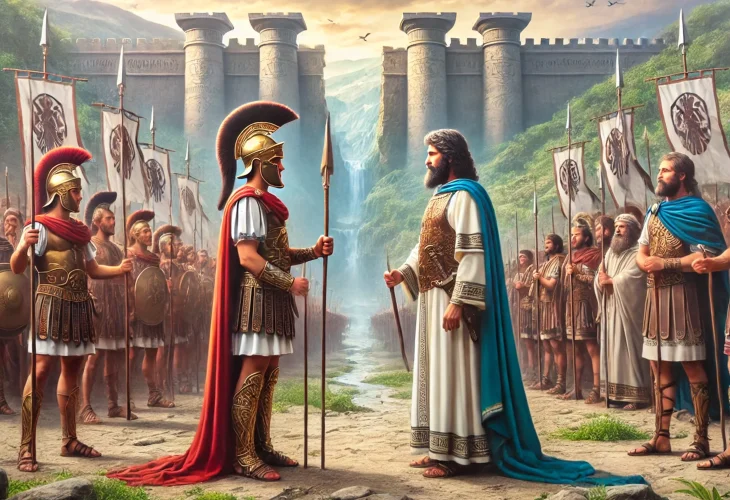The Cultural Shift that Shocked the Ancient World
In the ancient world, longstanding beliefs and practices were suddenly up for debate. People began comparing cultures, giving ratings, and even suggesting changes.

The Hellenistic Empire brought a unique approach to wisdom and culture, differing from previous empires. Before Alexander the Great, when one nation conquered another, the conqueror showed little interest in the beliefs or customs of the conquered. They merely demanded obedience and taxes. Alexander changed that. Being a student of philosophy, he was keenly interested in the beliefs of other nations and also shared his culture with them. He proposed a blending of cultures, and his successors continued this approach.
For many, the Hellenistic conquest was a refreshing change. The conquerors did not aim to destroy or alter the conquered peoples; instead, they introduced new concepts such as body culture, various sports, Greek mythology, and other cultural symbols that were thought to broaden horizons and possibilities. Alexander listened to "oracles" in Egypt, engaged with Persian cultural symbols, and in every land he conquered, he established a city named Alexandria to propagate his culture. Within the Hellenistic Empire, there were cities called "polis," which were part of Greece, and their inhabitants enjoyed citizenship rights as in Greece.
Ptolemy I, the first Hellenistic king of Egypt, invited writers, poets, painters, scholars, and thinkers to his country, providing them with ample funds, institutions, and facilities such as a library, a botanical garden, and even an observatory. The great library in Alexandria eventually held over a million books. It gathered cultural treasures from all nations, and even the Torah was translated for this library.
The entire ancient world was shaken. Beliefs and customs that had been considered stable for thousands of years were suddenly subjects of discussion and criticism. People around the world began comparing cultures, giving them ratings, and suggesting changes. In the Greek polis cities throughout the empire, schools were established for ages 7 to 14, where they taught music, arts, sports, and wrestling. At age 14, students could enter the gymnasium, where they learned rhetoric, mathematics, and astronomy, and received military training. This template remains in Western culture today, where there is a similar age structure for primary and middle schools. Greeks were prevalent everywhere, mingling and marrying with locals, spreading culture rather than being destructive conquerors. The Greeks also learned about local culture and incorporated it into their education system.
The Greek language became the language of governance, and anyone wishing to advance in society had to know Greek. Schools taught Homer's Greek myths and combined Greek ideas with local ones. For example, in the Phoenician city Resheph, founded in honor of the god Resheph, city scholars concluded that the god Resheph was the Greek god Apollo, leading to the city's rebranding as Apollonia. Local temples were built in a style blending with Greek styles. Scholars from lands conquered by the Greeks engaged in scientific research following Greek wisdom and began writing their countries' histories. Thus, Manetho, an Egyptian priest learned in Greek, wrote the history of Egypt in Greek, and Berossus, a learned Babylonian priest, wrote the history of Babylon.
The concept of "Hellenization" existed even before Alexander the Great, referring to cities in the Greek region that chose to become part of Greek culture, speaking Greek and utilizing Greek wisdom. The Greek historian Thucydides, in the fifth century BCE, described the great war between Athens and Sparta, noting how at one point, the city of Argos decided to Hellenize (using the term for adopting Hellenic ways). After Alexander's time, with the empire's expansion, Hellenization became widespread. Great cities became Greek "polis," pleading for citizenship rights based on Greek mythological language, claiming, "look, our city is mentioned as a place where the great Elias once set foot in the past."
While the world was changing, the Land of Israel remained apart. Alexander the Great arrived from the north in 332 BCE after besieging Tyre for six months, destroying old Tyre and building a causeway to the island city from its ruins. He passed through the Land of Israel. Simon the Just went out to meet him at Antipater, near the source of the Yarkon River. As the Yarkon was a mighty river at the time (most of its water is now diverted), the army couldn't cross it. The western part of the Land of Israel was divided into two regions, with no transport means between them, north and south of the Yarkon. Caravans passed only east of Antipater, avoiding the Yarkon outlet. Alexander spared Simon the Just and all of the Land of Israel without any bloodshed, and from there, he advanced to a brutal siege of Gaza and subsequently the conquest of Egypt.
This situation persisted for many years.
To read previous chapters, click here >>

